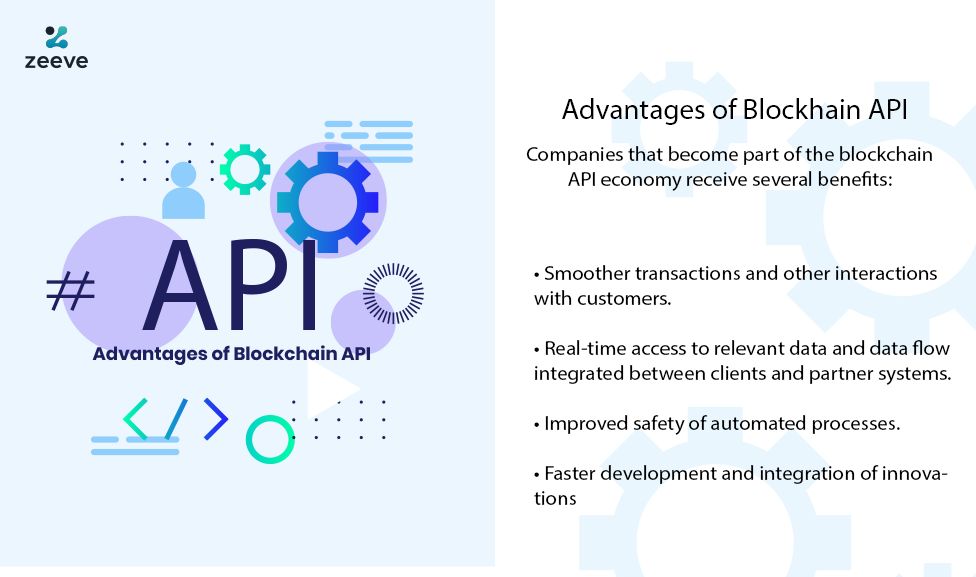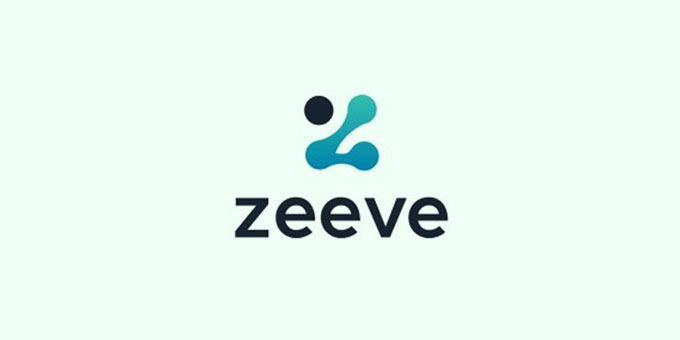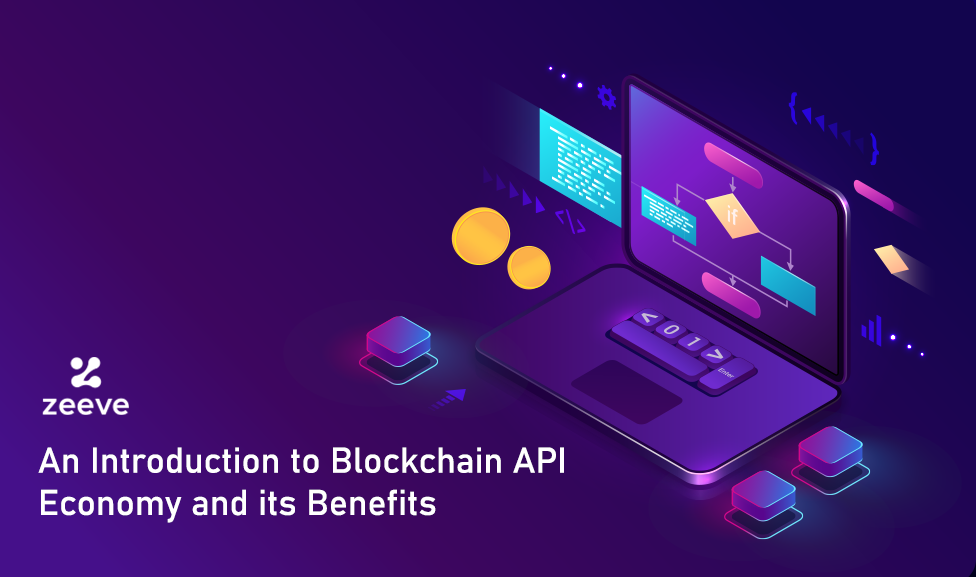Blockchain technology is known for its robustness and unparalleled security. In the ever-evolving blockchain world, many platforms leverage the Application Programming Interface (API).
The API is the application that allows the seamless movement of information between the different applications. Currently, the users are in an ethical dilemma to share the information or not. While at one point it’s necessary but at the same time, there are infringement cases.
The API 2.0 or blockchain API focuses on the control and security of data. While 65% of global companies are a part of the API economy, the blockchain API economy is going to be an emerging leader in the future.
The initiative to create a new form of APIs in accordance with blockchain has given rise to decentralized APIs or dAPIs. In the blog, we will learn more about the blockchain API economy and its advantages and about a few of the challenges.
The First API Economy
The concept of API is to plug into a system and get functionality without compromising efficiency and quality.
The blockchain API economy is when businesses started integrating API as it is beneficial to expedite business operations. The easy establishment of the apps with other apps improves the footprint of application usage. Subsequently, the revenue increase as deploying the existing app with another system is hassle-free.
The API provides an interface to communicate with the blockchain node and connects the exchange and the user application.
What is Blockchain API Economy
The blockchain API economy is booming — the business model is built on API usage along with blockchain. These APIs generate more value for the business and deliver services much faster. With 40% of the organizations being a part of the API economy, the new companies are shifting towards the blockchain API economy.
A major shift has been observed because blockchain offers decentralization. Further, the blockchain API economy will help construct new solutions for enterprises adopting blockchain for transactions.
An Introduction to Blockchain API
API 2.0 is about the merging of blockchain, Web3, and IoT. The open ledger technology democratized the way industries work. In the blockchain, the network dynamic is trustless, i.e., the data is distributed, and can’t be collected, unlike Web 2.0. For instance, Google Maps keeps the information collected by the apps that use its API. Thus, APIs are known to collect data about the users. Earlier, the API sent a query and then the applications sent the results.
However, the blockchain changes it with a snap due to its built-in trust mechanism. For instance, many blockchain projects are built using the API. The API for the blockchain is making a huge impact in allowing transactions in real time.
Blockchain API platforms give users control over their information and its use. The blockchain-integrated platforms allow companies to control their information on mainstream centralized platforms such as LinkedIn, Facebook, and Upwork.
The blockchain API economy promotes a better flow of information. Few of the APIs are exclusively built for the blockchain, so there isn’t any requirement to integrate blockchain every time. The blockchain API economy merges the on-chain smart contracts and the HTTP APIs.
The Unique features of Blockchain API & Advantages
Unified System
The system becomes unified, which leads to trust and disturbance-free communication. For example, an API and blockchain integration in a car manufacturing network can give us information regarding the wear and tear of the parts.
A Bridge of Connectivity
Trust plays an important role in the blockchain network; similarly, the API community is also driven by the factor of trust. The transaction history and private keys are secured. The blockchain API forms a federated system of trusted devices.
System of Security
The security system is verified, and data transfer happens in an encrypted format. The blockchain and API verify each transaction and pass the data securely alongwith more reliability and authority.
Better Processing
The distribution of the information on the network is well managed, and thus the processing of the information by the API and the blockchain is efficient. The APIs can accept transactions and divide it into bite-sized information, which results in faster transactions.
More Collaboration & Ownership
Collaboration becomes more prevalent in the API network. The blockchain-based economy has given rise to effective authenticity in the network; therefore, collaboration and ownership among companies improved.
Powerful Chain Management
The blockchain API manages the chains effectively. The chains such as supply chain customer relation management result in better chain management by continuous tracking. Through tracking, any inefficiency in the node is highlighted, and any issue is resolved quickly.

Oracle and API
Oracle plays a huge role in establishing communication between the blockchain and API. The APIs can interact with the external data and create a path between off-chain and on-chain events.
The oracles in the blockchain API economy are further categorized into inbound and outbound oracles. As the name suggests, the inbound brings data from the external world to the blockchain network. The outbound oracles send data from smart contracts to the outside world. Such as a smart lock that receives payment on the blockchain and then opens automatically.
Challenges in the Decentralized Blockchain API
The second generation API had problems related to the interoperability of the oracle acts as an intermediary. There is something known as an “oracle problem” when the smart contracts can only interact with the blockchain through the oracles. One of the issues with the oracle node is that the infrastructure is high maintenance.
To overcome the issue, instead of opting for the third part oracle, the companies can opt for the first-party oracles, which are oracles owned by the API. These oracles provide more transparency. The users can use the private keys to eradicate the data tampering.
Use cases of the Blockchain-Based API
The blockchain API is beneficial for businesses and has myriad use cases. The developers can create a custom blockchain API for specific use cases of the blockchain API. The API also needs testing by any API-based tool to check its efficiency. The following are the use cases of the blockchain API:
Data Collection
The blockchain API can get information such as transaction address, block ID, hash, and height. Furthermore, the blockchain API can also provide information on the estimated time for the next block, the average number of transactions, the balance, and many more.
Smart contract API
The Oracles are used to create the off-chain data, and the APIs can be used to send information to the oracles for transferring it to the smart contracts. The smart contract and API integration are helpful in accomplishing events in the real world.
Cryptocurrency Transactions
The blockchain API is great for spot trading and derivative trading. The API also facilitates algorithmic trading. The live market data of cryptocurrencies can be retrieved by using the API.
Payment API
Enterprises can use the blockchain API to manage crypto payments. Instead of forming a blockchain infrastructure, enterprises can opt for the blockchain-based API as the payment address is being created to make transactions.
3 Points to consider while selecting a Blockchain API
Here are a few of the points to consider while selecting the Blockchain API
- Technology Overview: Keep a check on the libraries, programming languages, and architecture. The open-source code makes it easier to overview the technology.
- The Projects: Bitcoin is universal and the major APIs support mainly Bitcoin or ETH. However, enterprises are going beyond the popular cryptocurrencies. Do check the APIs provide support to the coins.
- Performance: The performance levels differ for different applications. The blockchain APIs have to complete several transactions per second. Blockchain technology is still low performance as compared to its centralized counterparts.
End Note
The blockchain and API integration will improve connectivity by forming a unified environment. The environment will make space for more collaboration and ownership among the companies. Still, there are drawbacks that will be eradicated in the coming years. Lastly, the strong community of developers and organizations will enhance the blockchain API.
The economy will improve in the upcoming years as blockchain adoption is increasing day by day. Simply put, say no to the intermediaries on the internet by becoming a part of the blockchain API economy.
Partner with Zeeve
Connect with Zeeve to become a part of the current blockchain API economy. Startups, enterprises, and organizations will foresee a massive advantage by collaborating with Zeeve for blockchain & API-based projects.
We feature a robust set of APIs to build DApps for a plethora of use cases across industries, including asset tokenization, NFTs, DEX, Stablecoins, etc. Zeeve supports Decentralized Finance (DeFi) space with decentralized storage, trusted nodes, and smart contracts.
To learn more about Zeeve, join us on Twitter and Telegram. Feel free to contact us directly.






















